UMHS Class of 2019 graduate Dr. Michael McCullagh completed a family medicine residency in June at Yuma Regional Medical Center in Yuma, AZ and started a hospitalist position at the same facility this summer. It’s been a long journey for the Canadian native—from his days of being a lifeguard, growing up in Kanata, a suburban town on the west side of Ottawa, Ontario to his time at UMHS and then graduating and completing a family medicine residency and starting an attending hospitalist position at the same hospital.
The UMHS Endeavour spoke to Dr. McCullagh about his experiences at Yuma Regional Medical Center, working first as a family medicine doctor, the challenges and rewards of treating the healthcare needs of migrant communities that cross over the border from Mexico to Arizona, the importance of being willing to learn and adapt, his medical education at UMHS, being a Canadian studying medicine abroad and more. We caught up with Dr. McCullagh on a weekend when he was in the final months of his family medicine residency and took time from his busy schedule to speak to UMHS about his amazing career as he prepared to start his new attending hospitalist job.
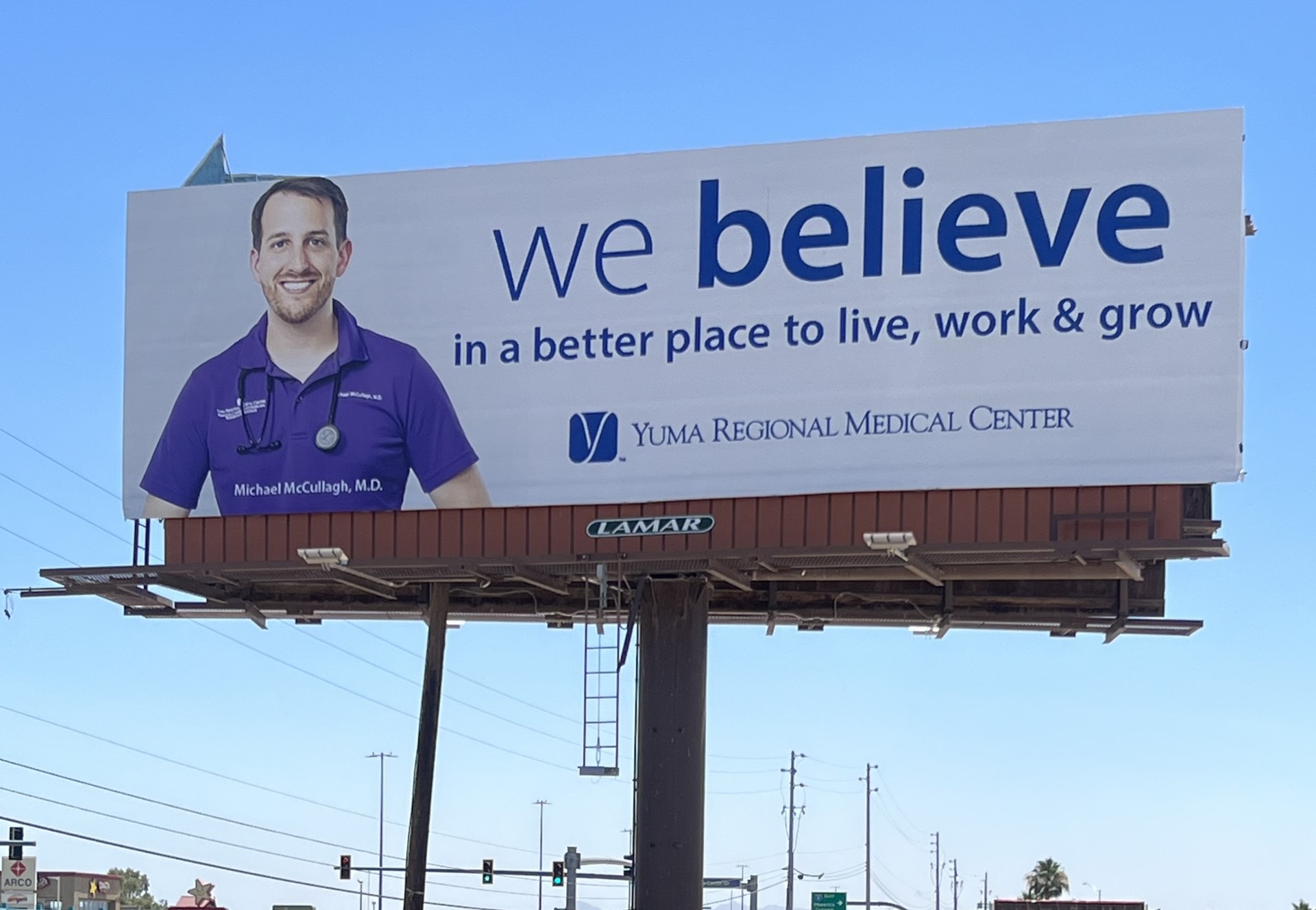 Dr. Michael McCullagh on a billboard advertising his hospital, Yuma Regional Medical Center in Yuma, AZ. Dr. McCullagh has been treating many migrants that have come to Yuma, a city on the US-Mexico border. Photo courtesy of Dr. McCullagh.
Dr. Michael McCullagh on a billboard advertising his hospital, Yuma Regional Medical Center in Yuma, AZ. Dr. McCullagh has been treating many migrants that have come to Yuma, a city on the US-Mexico border. Photo courtesy of Dr. McCullagh.
Family medicine & new hospitalist position in Arizona
UMHS Endeavour: Dr McCullagh, can you tell us about what you're doing right now with your family medicine residency at Yuma Regional Medical Center in Arizona and what that experience has been like for you?
Dr. Michael McCullagh: Sure, of course. First and foremost, it's a pleasure to be on here today. I always jump at the chance to be able to give back to the medical student that I once was, everybody in that same position. I know how difficult it can be, and any amount of information or being able to hear about success stories, anything like that, it goes a long way. So, I'm happy to be here today.
We’re happy to have you.
I'm just finishing up my residency program here in Yuma, Arizona, which is the most southwest region of Arizona right on the Mexican border—which in and of itself is an interesting place to practice medicine. I [just completed] my chief year, so my last year of family medicine. And I was thankfully and graciously elected as chief to be a representative for my residency program. In June, I graduated from residency and transitioned into a new role as an attending hospitalist here at YRMC. So, I'll be staying in town and I'll be doing that for the next foreseeable future, the next couple of years anyway. And I'm pretty excited about that.
Okay, great.
It has been great. Yuma Regional brings lots of really interesting aspects to practicing medicine, things that maybe otherwise you would never get exposed to. I think I first heard about YRMC as a third-year medical student. And one thing I recommend to everybody, especially as a medical student, as a Caribbean medical student, is going to as many conferences and networking events as possible. But in my third year, I went to the national conference, the AAFP National Conference in Kansas City and I met some of the Arizona programs, one of them being Yuma. So, I was first introduced to them there. A number of the faculty members and the program director had given a few of the presentations actually during that conference.
And then with my interest in global health has just crossed on a few other occasions as a third year, as a fourth year, I went to some of the Global Health Summit conferences throughout the country, one of them in Florida, and I bumped into the program again. They're very invested in global medicine, the idea of local medicine where you can practice global medicine aspects but within our own borders as well. They have a presence in the global health community. So, I was able to bump into them again and speak with them a little bit more and learn a little bit more about the program, and it just worked out. I was able to come down and rotate as a fourth-year medical student here at the program, residency program. And I was happy to have matched into this program.
I couldn't have been happier being family medicine; you really want to have a good experience where you can of course both learn practice medicine, both in the clinic and the hospital setting, but as well really get involved in the community. So here, I've had a few really interesting opportunities. I've volunteered for the sheriff's department here in Yuma where I do search and rescue with them. We're always right along the border. We're helping those asylum-seeker populations who are crossing the border. We're here providing care. I'm sure a lot of people have maybe heard about some of the challenges with providing healthcare in the setting of migrant population coming across that border, and we're right at the heart of it here in Yuma. We see it every day. We're treating these patients. We're on the border picking them up.
So [it has been a] really cool experience, especially if you have a passion in global health or just a passion of asylum medicine in general. It's been a great opportunity, very well-rounded training. I feel very strong coming under this program to pretty much pursue whatever I have interests in, whether it's outpatient medicine or inpatient medicine. For me, I'm going to go more on the inpatient side, but I feel very well-prepared coming out of this program.
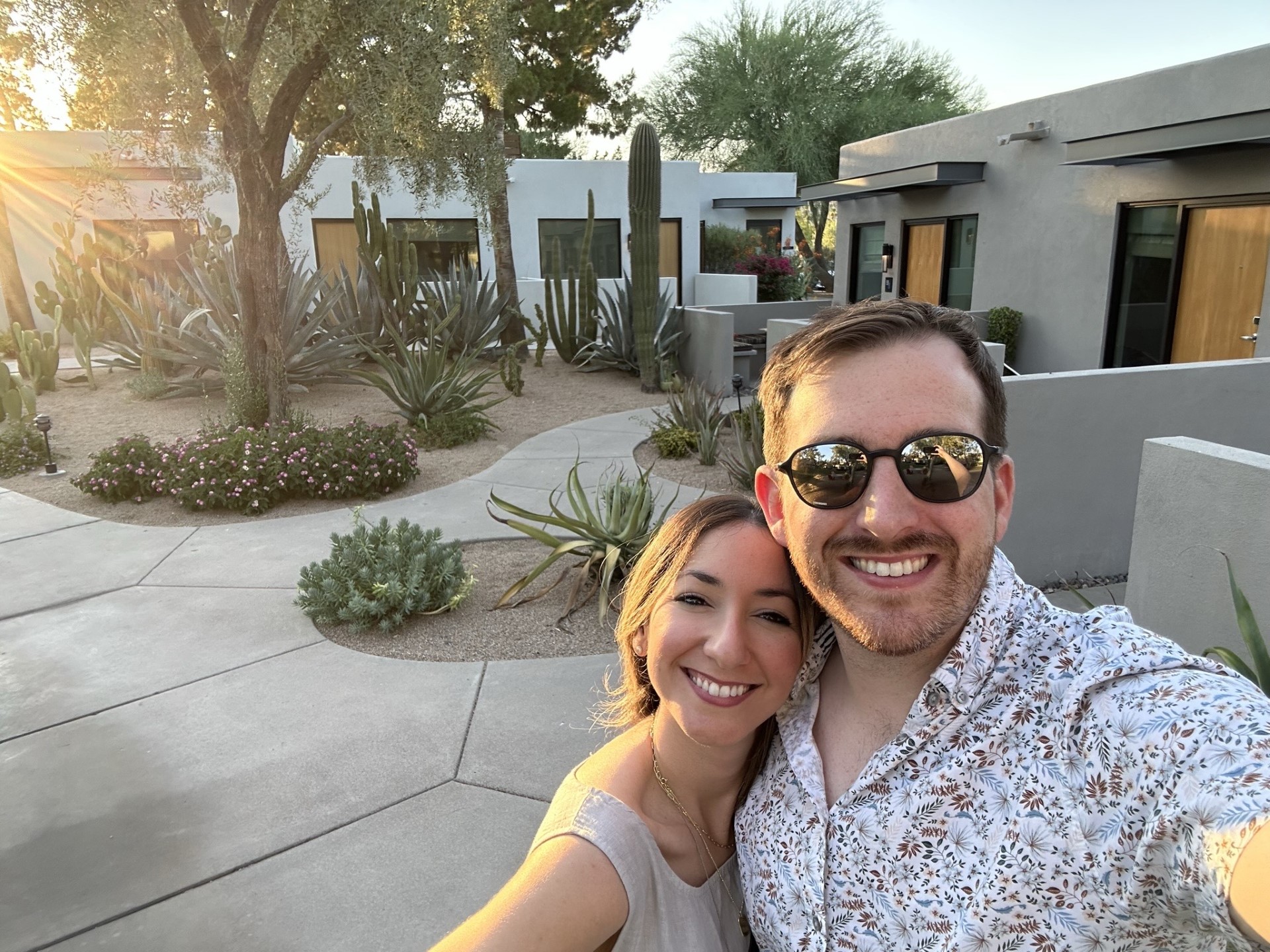 Dr. Michael McCullagh & his partner, Dr. Pamela Cuebas, a UMHS grad currently in her last year of a family medicine residency in Yuma. Photo courtesy of Dr. McCullagh.
Dr. Michael McCullagh & his partner, Dr. Pamela Cuebas, a UMHS grad currently in her last year of a family medicine residency in Yuma. Photo courtesy of Dr. McCullagh.
So, you really are really serving some of these underserved communities like these migrants and people coming over the border. That's amazing. Please tell us a little bit about that and how you became interested in the hospitalist aspect of medicine—since you just started an attending hospitalist position at the same hospital. Also, can you please explain to our younger prospective students or current students exactly what an attending hospitalist does?
I'll touch on what hospitalist medicine is. And, of course this can differ depending on whether or not you want to practice in Canada or just different states. The hospitalist role can be a little bit different. But in general, it's a specialty within medicine that is really interested in the comprehensive care of the hospitalized patient. Whereas a family medicine doctor who practices outpatient is that role in the outpatient setting, as a hospitalist, you fulfill that role on the inpatient setting. We're coordinating the safe, efficient care, coordinating between specialists. We're making sure the patients are getting the services that they're requiring while in the hospital. We're the point person to make sure that everything's going as it should. And then we're also working with a number of other specialists within the hospital, whether it's social work or case management to have a really, really safe discharge plan for these patients.
And coming from family medicine and having an expertise in what are the community resources, I've been in these patients' houses here. I understand what the population in Yuma is like in terms of what kind of services they can access in the community, what kind of lack of services that we have here. So, it puts you in an interesting position where both you're treating the patients for their medical problems, but you're also setting them up really for prevention, trying to keep them out of the hospital in the future. So, it's a pretty cool role that you can fulfill within the hospital system.
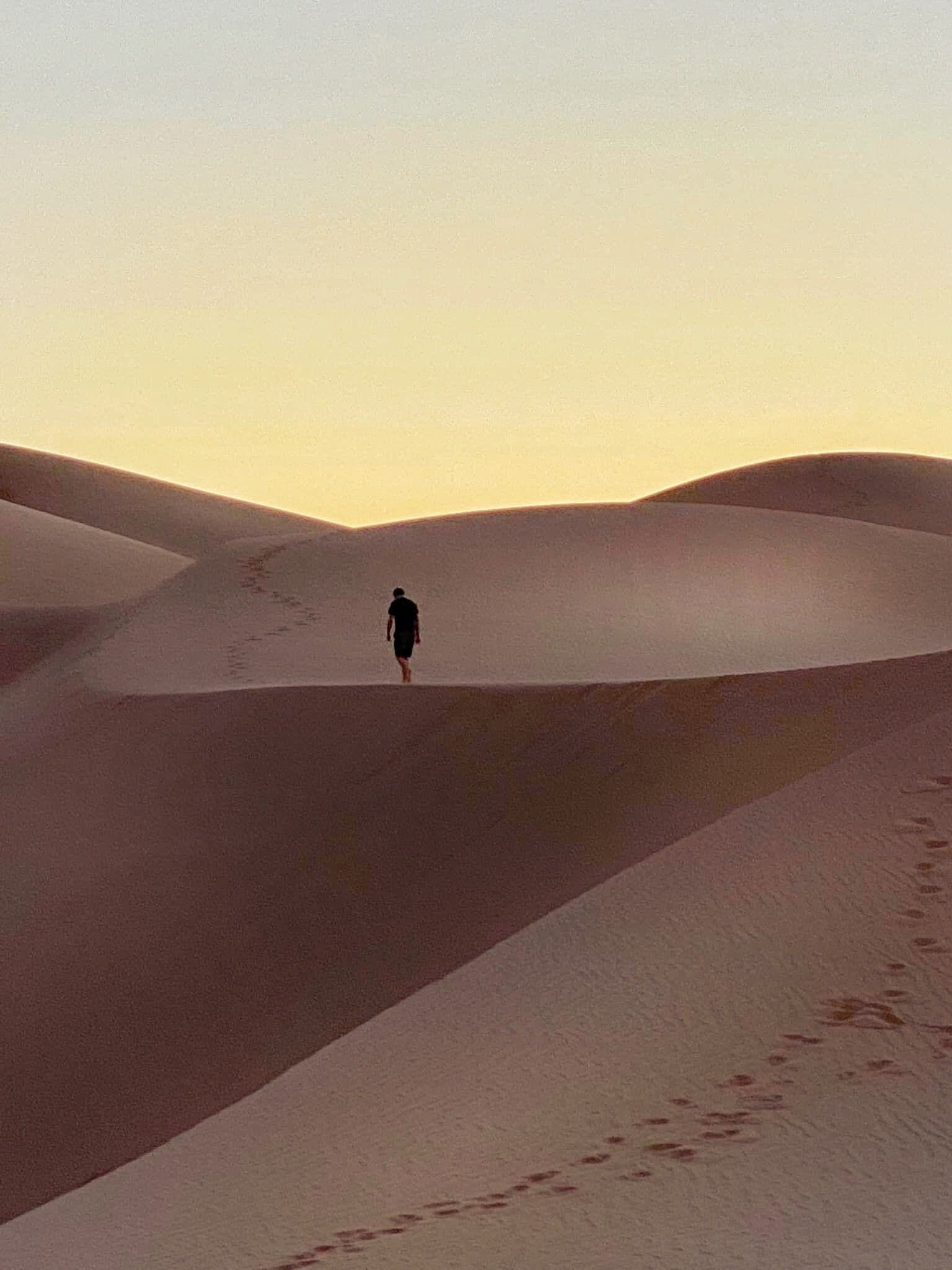 Dr. Michael McCullagh walks in the Arizona desert. Photo courtesy of Dr. McCullagh.
Dr. Michael McCullagh walks in the Arizona desert. Photo courtesy of Dr. McCullagh.
Recruited by UMHS Canada rep Geneviève Gagne
Can you please tell us one or two things that you liked the most about UMHS, about being a UMHS student as a Canadian studying medicine abroad and how UMHS helped you become the doctor of the you are today? And anybody that on the staff that might've helped you?
I heard about UMHS actually when Geneviève Gagne or “Gen”—some of you may know her as she was one of the recruiters for UMHS. She was positioned to teach Canadian students about what UMHS is, and she had a presentation at my university, Carleton University in Ottawa, Ontario. So that's how I first learned about UMHS and what it was and that was my first real introduction to Caribbean, the idea of Caribbean medical schools. I tend to see a lot of Canadians at least think about medical school if they've chosen a non-traditional path in Ireland and Australia. And for me, I didn't initially really think about the Caribbean until Gen gave that talk. And after thinking about it and doing research on my own, I felt like the Caribbean route was the more reasonable route for me. So, I knew that I probably wanted to initially stay in the US and do a residency here. And doing medical school in the Caribbean affords you to have a lot of opportunity to rotate in the US and be in the health systems down here and make contacts and meet people within the US medical systems.
So that and amongst many other things was one of the reasons why I thought more about the Caribbean, and UMHS was really the front-runner the entire time. I did briefly look at a number of other Caribbean medical schools. And it may be cliché and I'm sure a lot of people say this, but UMHS really has a family feel.
Of course.
I always felt very comfortable talking with every administrator, every staff member that I encountered through the process of applying. And I just feel very comfortable learning more and more about it as I did more research, the class sizes were a lot more reasonable at UMHS, and the success stories coming out of UMHS were absolutely great. I had the opportunity to meet a number of doctors who I could see what the end looked like, and that was one thing that really solidified my decision. But Gen definitely helped me through that process. I was very proud to go to UMHS. I felt like our education was very strong. I felt like it was an awesome adventure. I got to travel around the US. I got to spend a lot of time in different areas of the US. And being a Canadian, I think that's something that if you enjoy traveling, that's something that you look forward to. I got exposed to pretty much every region of the US from Maine, down to Florida, Georgia, in Arizona, Wyoming, all over the place. So very, very cool opportunity, very cool experience.
As a resident here in the US, I've also worked with a number of medical students. A lot of Arizona medical students have come through, but also a lot of international grads as well, some of them even from UMHS. And I've always felt being on this side of things, looking at the quality of education and the type of students that I was supervising and working with, that it was always the Caribbean medical students that were more interested, seems to be more well-rounded people, seems to be just strong, strong people, strong candidates.
I think a number of reasons for that most likely, one of them being coming to the Caribbean is non-traditional. A lot of the time these students applying on this pathway have had either a first career, or who have had a lot of experience within not just the medical community or medical specialties, but just really interesting experiences in their life that have made them resilient people, made them prone to getting through difficult situations and coming up positively on the other side. And I felt like I could really see that and I could see the difference between the Caribbean students and the US IMG or the US medical students as well.
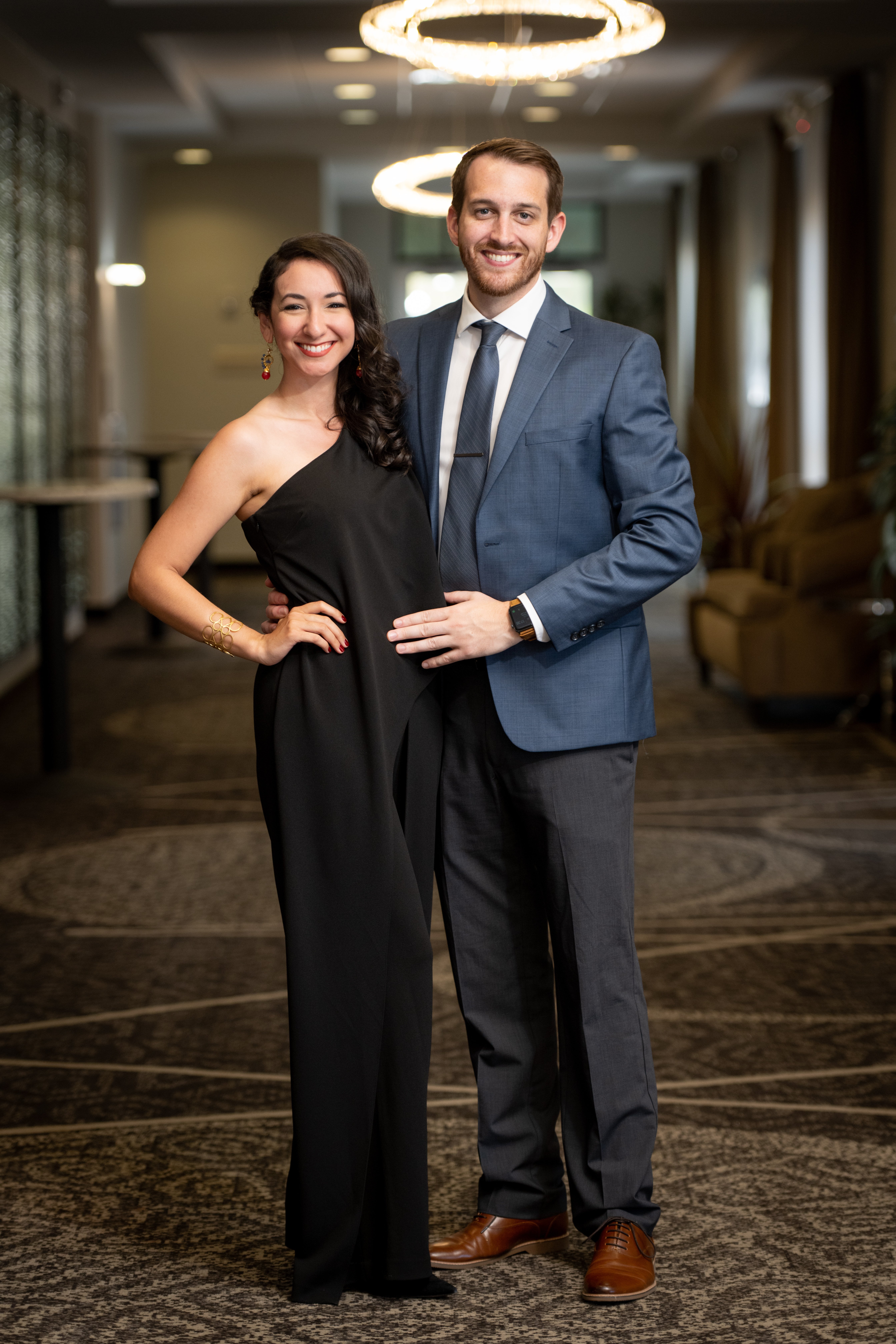 UMHS grads Dr. Pamela Cuebas & Dr. Michael McCullagh at an event. Photo courtesy of Dr. McCullagh.
UMHS grads Dr. Pamela Cuebas & Dr. Michael McCullagh at an event. Photo courtesy of Dr. McCullagh.
Undergrad & working with emergency care & Canadian Coast Guard
Dr. McCullagh, you received your bachelor’s degree in neuroscience from Carleton University in Ottawa, Ontario, Canada in 2015. Your first experience related to medicine was in high school, when you were a lifeguard. Can you please tell us about some of other healthcare-related projects you did before medical school?
Through university, I worked with the Canadian Coast Guard Search and Rescue so I got a good exposure to medicine there. As well as I volunteered as an EMT in upstate New York, which is only about 45 minutes from Ottawa. I was able to practice as a paramedic down in New York State, which was awesome. So, all those experiences I felt were really just developed my passion for medicine. And I felt as I went through university, probably about second year, I was pretty convinced that I wanted to do something within the medical field. And having a few other friends who had gone through medicine and knowing a few people who had come out on the other side and were practicing— it really inspired me to pursue medicine.
Why UMHS?
What would you say is one thing that made you choose UMHS over other med schools as a Canadian studying medicine abroad? What comes to mind?
Initially the decision was just my interactions with UMHS. It was my interaction with Geneviève Gagne. It was through the application, the whole interview procedure. And then of course as I went through medical school, I learned a lot of other reasons why UMHS was a much better choice than other schools. Going through my rotation, clinical rotations in the US, of course we interacted with a lot of medical students from other Caribbean medical schools and the stress level that they had, the competition that they had, even amongst their own peers in medical school, the overwhelming class sciences, the astonishing, I can't even fathom, costs of their education, I learned that I was really happy to have chosen UMHS. AS I went through, I learned that yes, this is definitely the right choice for me. I think the quality of education being on St. Kitts was awesome. The island is beautiful. I really took the opportunity to just think about travel around the US, to live on a Caribbean island for me four semesters, so about a year and three months or so. Overall, it was just a really cool experience.
Becoming an attending hospitalist & treating migrants
Let’s switch gears and talk about your new attending hospitalist position. What interests you the most about becoming an attending hospitalist? We’ve had some graduates that have become hospitalists and they talk about the good work-life balance, but I'd like to get your perspective. I think your experience is different slightly because you've been treating migrants coming over the border. That's in the news a lot now and unfortunately, there are lots of politics involved with it. What are some of the challenges involved with treating migrants? And also some of the positive things we don't hear about? In the USA, we hear a lot of negative stuff about the migrants coming over.
Sure.
The border crisis is big news now. Let’s disregard the media biases and instead talk about the medical aspects of what you’ve learned while working with migrants and people coming over the border, what some of their healthcare needs are? What should young doctors and future doctors know about treating migrants that we don't normally hear in the news?
I think it's difficult when you hear a lot of [media] stories about what's happening down here and then actually experience what's happening down here—two different things. When you're in the hospital treating these people, when you're providing medical care at the actual border as they come across, you're exposed to a different population of people that they really don't highlight in the media and the news. They [the media] like to focus on the negative, but that is such a minority of what's truly happening. These people are coming across with a channel that is appropriate and preexisting and legal. They're coming through in the way that's designed for them to come through. It's not like people are trying to come across illegally. They're doing everything they can to escape a really terrible situation in countries that they're coming from.
We're here on the border of Mexico, but it's not just Mexicans who are coming across. We've seen an insurgence of people from Ukraine. We've seen a surge of people from Central and South America. Everybody's leaving a bad situation and trying to get themselves into a better situation. And I can't really fault people for doing that, especially when there's a channel that's set up for them to do that. The adversity that these people go through, hearing stories about people fleeing terrible situations in Europe or in Asia and making the journey all the way down bottom tip of South America and traveling all the way up through South, Central America, through Mexico, trying to hit the US border. It's crazy the journey that these people are going through, and we're the ones receiving them on this side.
We do everything that we can to help them. There's lots of really great organizations who focus on treating this specific population of people, and there's programs that are set up where we try to assist them in linking up with their sponsors here in the US, trying to get them streamlined to a place that's sustainable, to a family that will support them financially, trying to limit the burden as much as possible on the US population, the government and all of that.
That being said, there are challenges, too. Being a physician at a hospital, really there's no other hospitals within a 200-mile radius of us, so we deal with a lot of what comes through our region of the border. And it can sometimes be difficult, especially when people come across in bigger groups, when there's big populations of people coming across at the same time, especially those who are seeking medical care. Generally, in the summer months, that's something that we see a lot because it's very hot down here and people run into troubles trying to traverse, to travel through. So, it does stress the hospital a little bit, of course, both financially and as well just personnel-wise. But I think it's just another one of those unique aspects, developing our school for not just medicine but where you'll be susceptible to that thing again, or you'll be in a situation where you have limited resources, a setting where maybe you don't have the support you need. I feel like it's just really helped us in our journey more than burdened us in our journey trying to.
So you're really treating medically underserved communities. You've treated patients not only from Central and South America—migrants leaving countries that have corrupt governments and abject poverty—but also the Ukrainians coming through the border. That's just amazing.
It is certainly a privilege to be able to provide and practice medicine in this era. And it's something that I look, as difficult as it can be, I try to look positively on it and see that this is really enriching our experiences, and at the same time we get to help a vulnerable population.
I know hospitalists are one of the “newer” specialties. I don't know what your particular situation is, but many hospitalists have told us that it really is great because it creates a nice work-life balance that you're able to practice as the doctor for a few and intense weeks and then you do actually get some time off to spend with your family or to pursue leisure activities or whatever. I don't know what the situation is at your hospital.
Yeah, so that's true. It is a "new-ish"specialty. I think that role was always there, but now they're labeling it as something. And they're having a group of doctors who their job is to fulfill that role now where before it was a role that internal medicine played, and really there was a little bit of a lack of who's responsible for this particular type of role. So, it's interesting, and it's an interesting new specialty. But it is a little bit different depending on where you practice. In Canada, they use hospitalists a little bit differently than they used them here, for example.
But down here [in the USA], yeah, that's right. It tends to be a little bit better work-life balance. Most of the hospitalist jobs across the country are generally a week on, a week off, two weeks on, two weeks off, 12-hour days for the most part. Certain roles within the hospitalist's job allows you to do something called “round and go” where you can come in the morning and manage all your patients, deal with any issues. And being in a small town like Yuma, I have the ability to go home and manage those patients—non-critical patients, of course—from home. If there's anything that happens that requires me to go in, I can go in about five minutes from the hospital. So that's never a challenge. I can go in, see the patients, do everything I need to do, tuck them away for the day, and should anything arise again, then I'm right there of course to help.
That also allows for a nice work-life balance. I told myself I didn't really want to do the usual Monday to Friday, 9:00am to 5:00pm. In medicine generally, 8:00am to 6:00pm, to speak for the most part. So, I was excited at that opportunity to be able to work a little bit harder for a good week, but then have a solid week, if not more, off and go travel, do what you need to do, go visit family. So that's certainly one of the pros to working as a hospitalist.
Anything that you would like to let the alumni know about, specifically Canadian alumni?
More than anything, I just highlight the difference in the way you can practice medicine are so many opportunities within hospitalist medicine and just in general as well, so many opportunities. Opportunities for growth, whether it be trying to get into administration informatics, trying to champion various committees within the hospital system. And coming from family medicine, I feel we're very positioned to really bridge the gap between the community and the hospital as well. There's a lot of community outreach that needs to be done and there's a lot of education that needs to be done for patients.
And as family medicine training and being able to really understand the community, community needs, it puts us in a cool position. So always think outside the box, get involved as much as you can, get involved with the local EMS, get involved with whatever search and rescue you have in the community. There are so many ways that you can experience medicine outside of the hospital. And I feel like a lot of the time to break routine to a way that allows things to freshen again for you to identify another passion or develop a new hobby, whatever it may be. I've tried to do that as much as I can. I've been pretty successful at doing some pretty cool things by doing that.
As for Canadians, there's becoming or there are lots of new pathways for trying to get back to Canada. So, for me, practicing right now in the US is something that makes sense for me right now. Not to say that in the future that I won't try to get back to Canada, and I think there's certainly a need. And we've seen in the last several months a lot of incentive programs from various provinces in Canada to try to bring people back to Canada as well. So really keep your eyes open for those opportunities coming up in the next probably year or two. I think it'll be easier and easier for us to get back to Canada if that's something that you are interested in and that fits a need or fits what's going on in your life at the time.
Is there anything else that you'd like to add that we haven't covered?
I think for the prospective students, more than anything, this is a really great adventure. A lot of people are maybe nervous about taking a step and committing to a life that maybe isn't what they envisioned initially trying to get into medical school, but keep your mind open. Speak with as many people as you can. Going to mixers, trying to speak with people, graduates from UMHS—do everything that you can to really understand what the process is. Really understand truly what it means financially, truly what it means to be away from your family, to live on a Caribbean island. Well, if this is your passion, this is what you want to do. There are so many success stories and so many people who have come out the other side who are very happy with what their decision was. So yeah, definitely anybody can do it.
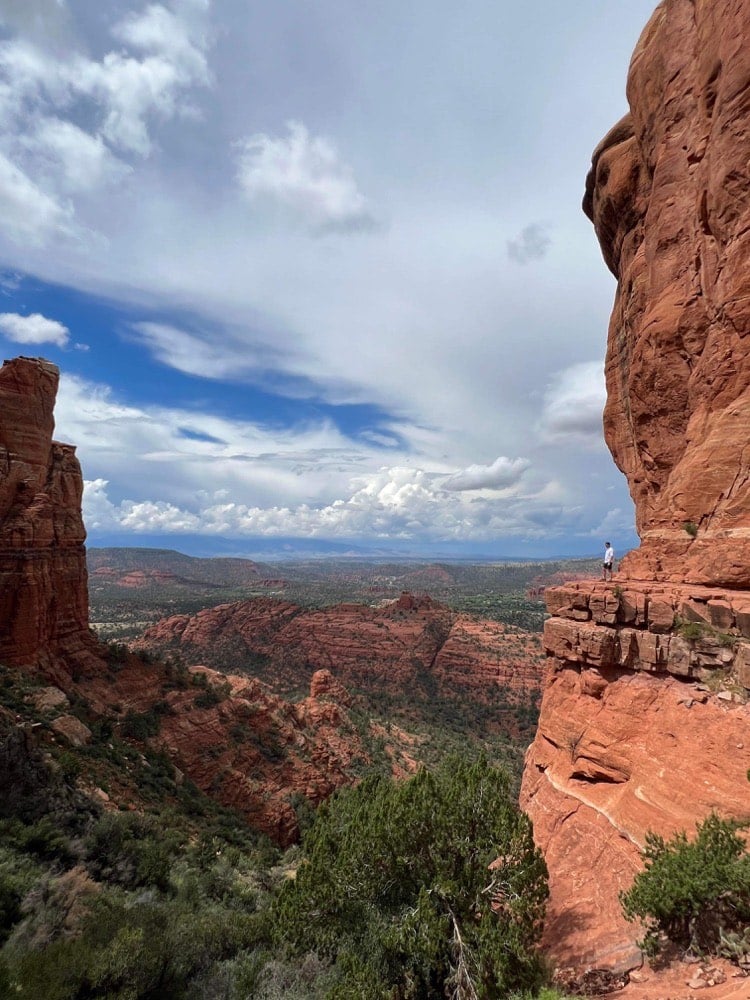 Dr. Michael McCullagh enjoying a spectacular view of the Grand Canyon in Arizona. Photo courtesy of Dr. McCullagh.
Dr. Michael McCullagh enjoying a spectacular view of the Grand Canyon in Arizona. Photo courtesy of Dr. McCullagh.
Email Dr. Michael McCullagh at michael.mccullagh.md@gmail.com
(Top photo): Dr. Michael McCullagh. Photo courtesy of Dr. McCullagh.
UMHS YouTube interview with Dr. Michael McCullagh

Scott is Director of Digital Content & Alumni Communications Liaison at UMHS and editor of the UMHS Endeavour blog. When he's not writing about UMHS students, faculty, events, public health, alumni and UMHS research, he writes and edits Broadway theater reviews for a website he publishes in New York City, StageZine.com.
















